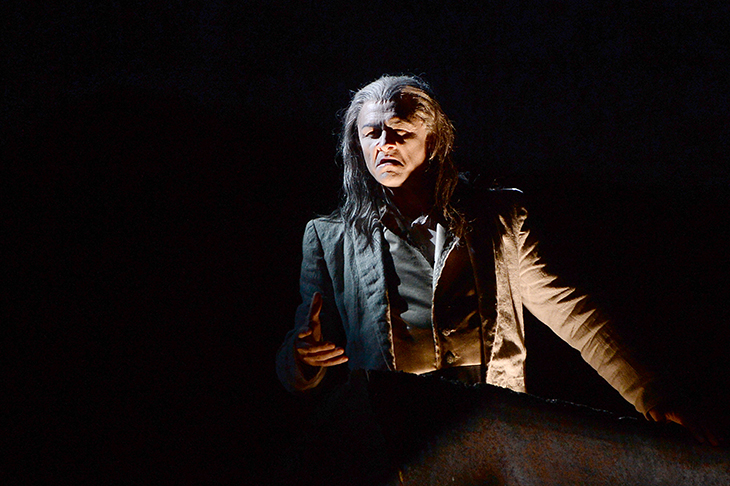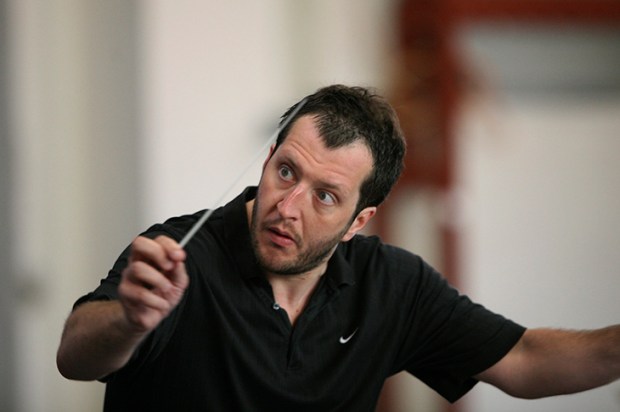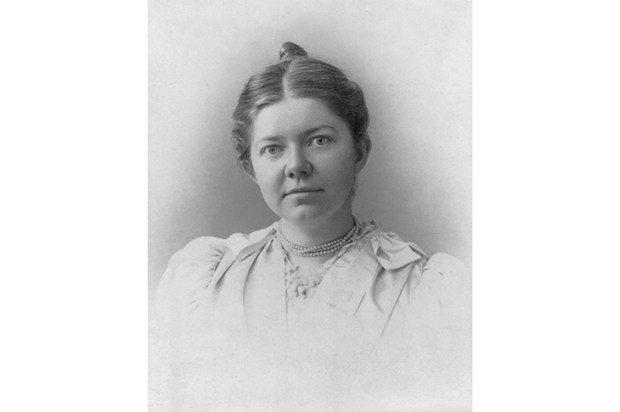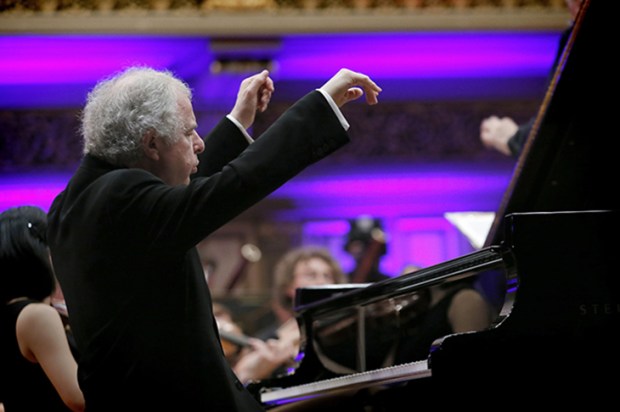Harpsichordists are supposed to make love, not war: Sir Thomas Beecham famously compared the sound they make to ‘two skeletons copulating on a tin roof’. But now two masters of the instrument, the Iranian-American Mahan Esfahani and the German Andreas Staier, are locked in mortal combat.
For connoisseurs of finely tuned insults, it’s riveting stuff. For their colleagues it’s a wretched business, because one of the two musicians is setting fire to his own reputation. Also, a third harpsichordist — a gifted young Frenchman, Jean Rondeau — has been cruelly dragged into the feud.
It goes without saying in period instrument circles that Esfahani picked the fight. The 33-year-old has been starting small wars since he launched himself a decade ago as the harpsichord’s global ambassador-cum-saviour. His modus operandi — damning his fellow musicians as racist snobs — is pointlessly offensive, but he can rely on the arts establishment for covering fire. A young Middle Eastern ‘baroquestar’ who supports #BlackLivesMatter? What’s not to like? And it’s true that there’s a refreshing quality to Esfahani’s playing and repertoire: he can dispatch a piece of American sewing-machine minimalism as nimbly as a Tudor pavan.
He’s also pretty dexterous with the ‘block’ button on social media, as I discovered a few years ago after a political squabble. Before that, I’d met him once. He was charming and garrulous. I can understand why he makes friends easily and why they’re upset when they’re dropped for accidentally implying that Mahan isn’t the only show in town.
Anyway, now things have got out of hand. In April, Esfahani told the online magazine Van that other harpsichordists were spreading sinister nationalism. At the Bruges festival, it was ‘sickening’ to hear students from the Low Countries and France dismiss the Russian school as mere technicians. ‘How the fuck do they know? Are they saying that the Russians are unable to feel this music in the same way?’
At his own recital in Bruges, complained Esfahani, ‘the Dutch and French students all stayed away, but were happy to inform me that their teacher thought my own performance style was “unique”.’ As for the Americans, their ‘Stockholm syndrome’ led them to imitate the Dutch or the ‘limp-wristed’ French.
Finally, a swipe at an unnamed rival: ‘Having funky hair or playing a little bit of jazz doesn’t make you iconoclastic if your harpsichord playing is perfectly orthodox.’
All this was too much for Staier, whose response to Esfahani, also in Van, is not so much a reproof as an evisceration.
According to Staier, Esfahani bleats endlessly about ‘how hostile powers are conspiring against him, the innocent victim.’ At the 2006 Bach Competition in Leipzig, Esfahani ‘simply refused to accept that he didn’t make it into the finals.’ He was willing to blame everyone and everything, ‘except for his own playing’.
Which Staier does not rate. The only time he saw him play live, ‘his figured bass realisation was not up to the complexity of English and French music of the 17th and 18th centuries… the voice leading was incorrect and awkward, the chords were wrong, and the polyphonic textures oversimplified.’
All this might have been left unsaid, however, if Esfahani hadn’t referred to funky hair.
‘He doesn’t name names, but it’s Jean Rondeau,’ writes Staier. He has never met Rondeau, but he’s outraged that Esfahani should pick on an artist still in his mid-twenties, who in any case he considers to be ‘the more competent musician’.
Not everyone agrees and I can’t judge: I recently heard Rondeau play a programme of French baroque pieces with rock-solid virtuosity at St Peter’s, Eaton Square, but the acoustic swallowed a frustrating amount of detail. He’s certainly younger and (if you go for the hipster thing) way cooler than Esfahani, who may possibly regard him as a threat or he might not have let rip with his trademark furious snark.
That’s rich coming from me, I know, but my online spats aren’t potentially damaging an international career. The comments underneath Staier’s article are spot on. Why was it left up to such an eminent figure to point out that ‘the nastiness which we frequently hear from Esfahani is unprecedented’? Why has no journalist challenged his paranoid invective? Why does the BBC massage his ego when he sneers at its presenters on Twitter?
He’s a good harpsichordist, but it’s hard to banish the suspicion that it’s his ‘narrative’ that appealed to Deutsche Grammophon, for whom he’s recorded an interesting rather than revelatory Goldberg Variations. Is he naive enough to think that his DG contract makes him invulnerable? No company is quicker to ditch an artist when the wind turns. If that happens, and I bet it does, Esfahani will look around him and see nothing but burned bridges.
Got something to add? Join the discussion and comment below.
Get 10 issues for just $10
Subscribe to The Spectator Australia today for the next 10 magazine issues, plus full online access, for just $10.
You might disagree with half of it, but you’ll enjoy reading all of it. Try your first month for free, then just $2 a week for the remainder of your first year.














Comments
Don't miss out
Join the conversation with other Spectator Australia readers. Subscribe to leave a comment.
SUBSCRIBEAlready a subscriber? Log in